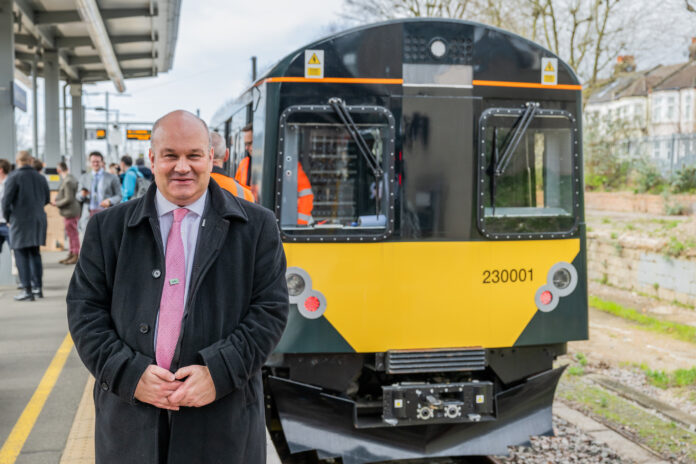Great Western Railway’s innovative fast-charge battery trial officially commenced yesterday (Monday 18th March).
Over the past two weeks, specialist GWR engineers have successfully tested the compatibility of the fast-charge technology with the Class 230 battery train on the Greenford branch line.
The industry-leading trial will now start in earnest and it is hoped the technology could one day see battery-powered trains in operation across the UK’s approximately 2,000 miles of 80-plus branch lines.
The fast-charge technology solves the problem of delivering reliable, battery-only trains and is designed to help meet the Government and wider rail industry’s target to reach net-zero carbon emissions by 2050.
GWR Managing Director Mark Hopwood, pictured, said:
“We want GWR to be at the forefront of the railway’s commitment to phase out diesel-only traction by 2040 and this demonstrates that we put our customers at the heart of everything we do.
“This is why we took on the challenge and are taking an industry-leading approach in not only battery train operation, but the development of the fast-charge system.
“It’s important to remember this work has never done before. It’s designed to test the capability and viability of the fast-charge technology – and demonstrates Great Western Railway taking a bold and broad approach towards replacing diesel-only trains with greener units.”
Rail Minister Huw Merriman said:
“We’re ambitious about making the railways even more sustainable and this trial, backed by Government funding, could pave the way for greener journeys for millions of passengers across the network.
“Rail is already the most environmentally friendly form of public transport and battery-powered technology will play an important role in further decarbonising it, helping us reach our net-zero target by 2050.”
Network Rail Industry Programme Director for the Thames Valley, Jo Grew, pictured, said:
“I’m so excited to see this trial come to life, and it shows the true hard work and collaboration that has taken place between GWR, the Department for Transport and Network Rail. This is a crucial technology that if successful could pave the way for deploying across branch lines around the country, enabling the rail industry to hit our decarbonisation targets.”
The use of batteries for extended operation has typically been constrained by their range and meant widespread implementation has, until now, not been possible. It also negates the need for overhead electric lines which are expensive, time consuming to install and impact the landscape.
At West Ealing, the train will charge for just 3 ½ minutes before restarting its journey on the Greenford branch line.
GWR has already carried out simulations on other branch lines in the Thames Valley to explore how it could be rolled out even further in the future. This could reduce GWR emissions alone by over 1,700 tons of CO2e per year.
Background
In February 2022, GWR signed a deal with Vivarail to trial new battery-charging technology designed to support the wider introduction of battery-powered trains on the UK’s rail network.
After Vivarail entered administration in December 2022, GWR agreed contracts to buy intellectual property, rolling stock and equipment relating to the FastCharge technology.
The battery train will run in non-passenger service alongside scheduled passenger services.

| [donate]
| Help keep news FREE for our readersSupporting your local community newspaper/online news outlet is crucial now more than ever. If you believe in independent journalism,then consider making a valuable contribution by making a one-time or monthly donation. We operate in rural areas where providing unbiased news can be challenging. |


















